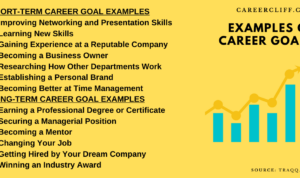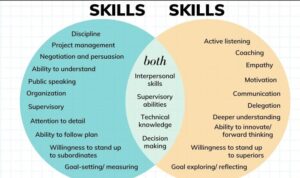Career Development Goals sets the stage for this enthralling narrative, offering readers a glimpse into a story that is rich in detail with american high school hip style and brimming with originality from the outset.
Embark on a journey through the world of career development goals, where aspirations meet action and dreams transform into reality.
Importance of Career Development Goals
Setting career development goals is crucial for professional growth as it provides individuals with a roadmap to success. By clearly defining what they want to achieve in their careers, individuals can work towards specific milestones and measure their progress along the way.
Examples of How Clear Career Goals Help Progress
- Increased Focus: Having clear career goals helps individuals stay focused on their objectives and avoid distractions that may hinder their progress.
- Opportunity Recognition: With defined goals, individuals are better able to recognize opportunities that align with their career aspirations and make informed decisions.
- Professional Development: Setting career goals encourages individuals to seek out learning opportunities, develop new skills, and expand their knowledge base to advance in their careers.
Impact of Well-Defined Career Development Goals on Job Satisfaction and Motivation
- Job Satisfaction: Clear career goals can lead to increased job satisfaction as individuals feel a sense of accomplishment when they achieve their objectives and progress in their careers.
- Motivation: Well-defined career development goals serve as a source of motivation, driving individuals to work harder, overcome challenges, and stay committed to their professional growth.
- Confidence Boost: Achieving milestones set in career goals can boost individuals’ confidence, leading to a positive outlook on their careers and overall well-being.
Types of Career Development Goals
When it comes to career development goals, it’s essential to have a clear understanding of the different types that can help guide your professional growth. Let’s dive into the various types of career development goals and their significance in shaping your career path.
Short-Term Career Goals
Short-term career goals are the stepping stones that lead to your long-term success. These goals are typically achievable within one to three years and focus on immediate actions and outcomes. They are essential for keeping you motivated, building momentum, and gaining valuable skills and experiences in a relatively short period. Short-term goals help you stay focused and make progress on your professional journey, ultimately leading you closer to your long-term aspirations.
- Enhancing specific skills or knowledge relevant to your current role or desired career path.
- Completing a certification or training program to boost your qualifications.
- Networking with industry professionals to expand your connections and opportunities.
- Achieving a specific performance target or milestone at work.
Long-Term Career Goals, Career Development Goals
Long-term career goals provide a broader vision of where you want to be in your career in five to ten years or more. These goals help you define your ultimate aspirations, shape your professional identity, and set a roadmap for your long-term success. Long-term goals often require strategic planning, continuous learning, and consistent effort to achieve. They serve as a guiding light that motivates you to make impactful decisions, take calculated risks, and pursue opportunities that align with your overarching career objectives.
- Obtaining a leadership position in your field or industry.
- Starting your own business or consultancy.
- Earning a higher degree or specialization to advance your expertise.
- Establishing a strong personal brand and reputation in your industry.
Performance-Based Goals vs. Learning and Development Goals
Performance-based goals focus on specific outcomes, results, or achievements that demonstrate your capabilities and contributions in the workplace. These goals are often tied to key performance indicators (KPIs) and are measurable, quantifiable, and time-bound. On the other hand, learning and development goals emphasize acquiring new skills, knowledge, or competencies that enhance your professional growth and effectiveness. These goals are centered on continuous learning, self-improvement, and expanding your capabilities to adapt to evolving job requirements and industry trends.
- Performance-Based Goals: Achieving a sales target, increasing client satisfaction ratings, or exceeding project deadlines.
- Learning and Development Goals: Attending workshops or seminars to enhance communication skills, gaining proficiency in a new software or technology, or completing a leadership training program.
Strategies for Setting Career Development Goals

Setting career development goals is crucial for personal and professional growth. By following specific strategies, such as creating SMART goals and aligning personal values with career objectives, individuals can increase their chances of success in their chosen field.
Setting SMART Career Goals
- Specific: Clearly define what you want to achieve in your career.
- Measurable: Establish criteria to track progress towards your goals.
- Achievable: Set goals that are realistic and within reach.
- Relevant: Ensure that your goals align with your career aspirations and overall objectives.
- Time-bound: Set deadlines to create a sense of urgency and motivation.
Creating a Career Development Plan
- Identify Your Strengths and Weaknesses: Conduct a self-assessment to understand your skills and areas for improvement.
- Set Short-Term and Long-Term Goals: Establish both immediate and future objectives to guide your career path.
- Develop Action Steps: Break down your goals into smaller tasks to make them more manageable.
- Seek Feedback and Support: Collaborate with mentors or peers to gain insights and guidance on your career plan.
- Regularly Review and Adjust: Continuously evaluate your progress and make necessary adjustments to stay on track.
Aligning Personal Values with Career Goals
- Identify Your Values: Determine what matters most to you in your personal and professional life.
- Evaluate Career Options: Choose a career path that aligns with your values and interests.
- Set Meaningful Goals: Ensure that your career goals reflect your values and contribute to your overall fulfillment.
- Maintain Work-Life Balance: Strive to create harmony between your personal values and career aspirations to promote well-being.
Achieving Career Development Goals

To achieve career development goals, continuous learning and skill development play a crucial role in enhancing one’s capabilities and staying relevant in the ever-evolving job market. It is essential to continuously seek opportunities to learn new skills, stay updated with industry trends, and adapt to changes to progress towards career goals successfully.
The Significance of Seeking Feedback and Making Adjustments
Seeking feedback from mentors, colleagues, or supervisors can provide valuable insights into areas for improvement and growth. By incorporating feedback and making necessary adjustments to goals along the way, individuals can enhance their performance and increase their chances of achieving their career development goals effectively.
- Regularly seek feedback from others to gain different perspectives on your progress.
- Be open to constructive criticism and use it as a tool for self-improvement.
- Adjust goals based on feedback and new insights to align them with your career aspirations.
Feedback is a gift that helps you grow and improve towards achieving your career goals.
Success Stories of Achieving Career Development Goals
Success stories of individuals who have achieved their career development goals through dedication and perseverance serve as inspiration for others on their career journey. These individuals demonstrate the importance of setting clear goals, staying focused, and putting in the effort required to overcome challenges and achieve success.
- One success story is that of Jane, who set a goal to become a senior manager in her company. Through continuous learning, seeking feedback, and making adjustments to her career path, she successfully achieved her goal within five years.
- Another example is Alex, who aimed to transition from a technical role to a management position. By taking on additional responsibilities, seeking mentorship, and continuously developing his leadership skills, Alex was able to achieve his career development goal in three years.




